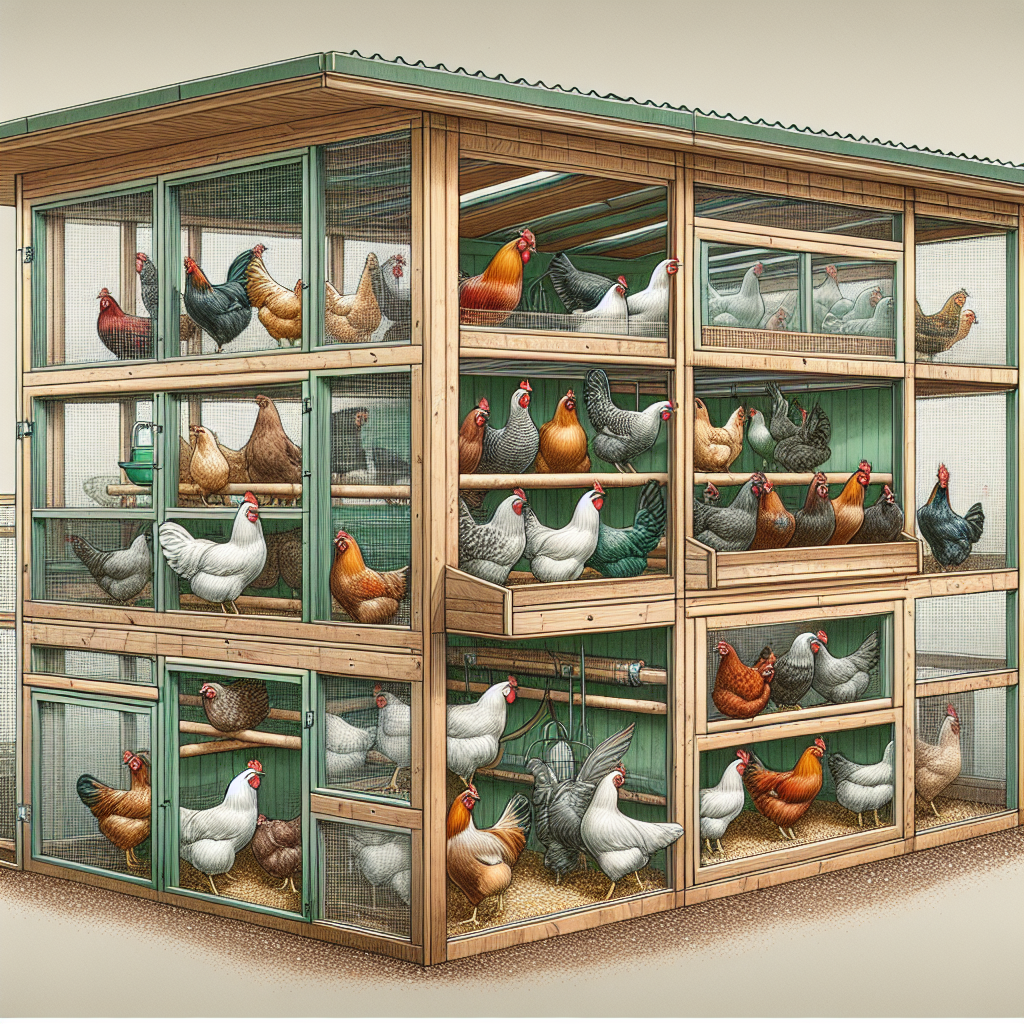Have you ever wondered about the financial implications involved in choosing between different types of coops? Well, in this article, we will explore the various financial considerations one must take into account when comparing the benefits of different coop varieties. From analyzing investment costs to evaluating potential returns, understanding the financial aspects of coop selection is crucial for making informed decisions. So, if you’re curious about how your finances can play a role in choosing the right coop, keep reading! When considering the financial aspects of investing in different cooperative (coop) varieties, there are several important factors to take into account. From initial investment costs to potential income and long-term investment potential, each aspect plays a crucial role in determining the financial viability of a coop investment. Additionally, understanding the tax implications, financing options, and the risk and stability associated with coops is essential for making an informed decision. In this article, we will delve into all these considerations and provide you with a comprehensive guide to making a financially sound coop investment.
Cost of Investment
Initial Investment Cost
The initial investment cost is the amount of money you need to put into purchasing a cooperative unit. This includes the purchase price of the unit itself, any required membership fees, and potential closing costs. It is important to carefully consider your budget and determine how much you are willing and able to invest in a coop. Comparing the initial investment costs of different coop varieties will help you make an informed decision and ensure that the investment aligns with your financial goals.
Maintenance and Upkeep Costs
In addition to the initial investment cost, it is essential to consider the ongoing maintenance and upkeep costs associated with owning a cooperative unit. These costs may include regular maintenance fees, repairs, property management fees, and potential renovation costs. It is crucial to factor in these expenses when evaluating the financial feasibility of a coop investment. In some cases, opting for a coop with higher initial investment costs but lower ongoing maintenance costs may be more financially advantageous in the long run.
Resale Value
Resale value refers to the potential value you can recoup when selling your cooperative unit. The resale value can be influenced by various factors, including location, market trends, and the overall demand for coop units in the area. Understanding the potential resale value of a coop investment is vital as it determines your ability to recover your initial investment and any potential profits. Conducting market research and consulting with real estate professionals can provide valuable insights into the resale value of different coop varieties.
Operating Expenses
Monthly Maintenance Fees
Cooperative units often require monthly maintenance fees, which cover the costs of shared amenities and common area upkeep. These fees can vary significantly depending on the size of the unit, the facilities provided, and the overall maintenance requirements of the cooperative. It is crucial to factor in these monthly maintenance fees into your budget to ensure that you can comfortably afford them alongside other operating expenses.
Utilities and Other Bills
In addition to monthly maintenance fees, you must consider the costs of utilities and other bills associated with owning a cooperative unit. These expenses may include electricity, water, gas, internet, and cable bills. The specific costs will vary depending on factors such as the size of the unit, the number of occupants, and the seasonality of utility usage. It is wise to gather information about the average utility costs for different coop varieties to include them in your financial considerations.
Insurance Costs
Insurance is another important aspect to consider when evaluating the financial considerations of different coop varieties. You will typically need to secure insurance coverage for your cooperative unit to protect against unexpected events such as fire, theft, or natural disasters. Insurance costs can vary based on the coverage limits, deductibles, and the location of the cooperative. It is essential to obtain insurance quotes and factor in the associated costs when assessing the overall financial picture of a coop investment.
Potential Income
Rental Income
One significant potential source of income from a cooperative investment is rental income. If the rules and regulations of the coop allow it, you can rent out your unit to tenants for a monthly fee. The amount of rental income you can generate will depend on various factors, including the location, size, and condition of the unit, as well as the rental market in the area. Conducting a thorough rental market analysis and consulting with local real estate professionals can help you estimate the potential rental income you can earn from different coop varieties.
Dividends and Profits
Certain coop varieties, such as housing cooperatives or worker cooperatives, may offer the opportunity for members to receive dividends or share in the profits generated by the cooperative. These financial benefits can provide an additional source of income for coop investors. However, the availability and amount of dividends or profits will depend on the specific rules and structure of the coop. It is crucial to carefully review the cooperative’s bylaws and financial statements to understand the potential dividends or profits and factor them into your financial considerations.
Tax Benefits
Cooperative investments can also provide tax benefits that contribute to your overall potential income. Depending on the tax laws and regulations in your jurisdiction, you may be eligible for tax deductions or credits related to your coop investment. For example, you may be able to deduct mortgage interest payments or claim tax credits for certain energy-efficient upgrades made to your unit. Consulting with a tax professional or researching the specific tax benefits of coop investments in your area can help you fully understand and leverage these potential tax advantages.
ROI and Payback Period
Calculating Return on Investment (ROI)
Calculating the return on investment (ROI) is essential for assessing the financial performance of a cooperative investment. ROI measures the profitability of an investment by comparing the gain or loss generated relative to the amount invested. To calculate ROI for a coop investment, you would subtract the initial investment cost from the total income earned (including rental income, dividends, and profits), and divide the result by the initial investment cost. Multiplying the result by 100 will give you the ROI percentage. Comparing the ROI of different coop varieties can help you determine which option provides the best financial returns.
Determining the Payback Period
The payback period refers to the length of time it takes for an investment to generate enough income to recoup the initial investment cost. Determining the payback period can help you assess the financial feasibility of a coop investment and understand how long it will take to recover your initial expenditure. The payback period is typically calculated by dividing the initial investment cost by the annual net income (income minus expenses). Comparing the payback periods of different coop varieties can provide valuable insights into the time frame for recovering your investment and making a profit.
Financing Options
Mortgage Rates and Terms
If you require financing for your coop investment, understanding the available mortgage rates and terms is crucial. Mortgage rates can vary based on factors such as your credit score, the loan-to-value ratio, and market conditions. It is advisable to compare rates from different lenders and carefully review the terms of each mortgage offer. Consider factors such as interest rates, loan duration, and any potential penalties for early repayment. Evaluating different financing options will help you secure the most favorable terms and ensure that the financial burden aligns with your financial capabilities.
Down Payment Requirements
Cooperative investments usually require a down payment, which is a percentage of the total purchase price paid upfront. The down payment requirement can vary depending on factors such as the location, size, and condition of the cooperative unit, as well as the specific loan program or lender requirements. It is important to budget for the down payment and ensure that you have sufficient funds available. Understanding the down payment requirements for different coop varieties will help you determine which options are financially viable for you.
Government Programs
In some jurisdictions, there may be government programs or incentives available to support cooperative investments. These programs can include grants, subsidies, or favorable loan terms specifically designed to assist individuals or organizations in acquiring cooperative units. It is essential to research and inquire about any available government programs in your area. Utilizing these programs can provide financial assistance and make coop investments more accessible and affordable.
Risk and Stability
Market Volatility
Like any investment, coops are not immune to market volatility. Changes in the real estate market, economic conditions, or local demand can impact the value and potential income of cooperative units. It is important to carefully consider the level of market volatility associated with different coop varieties and assess your risk tolerance accordingly. Conducting thorough market research, consulting with real estate professionals, and reviewing historical market trends can provide valuable insights into the stability and potential risks of coop investments.
Cooperative Stability
The stability and financial health of the cooperative itself is another critical factor to consider when evaluating the financial aspects of different coop varieties. Coop stability refers to the governance, financial management, and overall viability of the cooperative as an organization. It is important to review the financial statements, operating agreements, and any available audits or reports of the cooperative to ensure its stability. Understanding the cooperative’s financial position, including its reserves, debts, and financial sustainability, will help you assess the long-term outlook and potential risks associated with a coop investment.
Tenant Dependability
If you plan on renting out your cooperative unit, considering the dependability of potential tenants is vital. Reliable and responsible tenants can ensure a steady rental income and minimize the risk of property damage or other complications. Conducting thorough tenant screening, including background checks, credit checks, and reference verification, can help you assess the dependability of potential tenants. Additionally, understanding the rental market dynamics in your area and conducting regular inspections of the cooperative unit can help mitigate any potential risks associated with tenant dependability.
Long-term Investment Potential
Appreciation and Capital Gains
One of the long-term investment potentials of cooperative investments is the appreciation of the property’s value over time. Appreciation refers to an increase in the value of the cooperative unit, which can result in potential capital gains if the property is sold. The ability of a cooperative unit to appreciate in value will depend on various factors, including market conditions, location, and the overall demand for coop units in the area. Researching historical property value trends and consulting with real estate professionals can provide insights into the long-term investment potential of different coop varieties.
Renovation and Upgrade Opportunities
Renovation and upgrade opportunities can also contribute to the long-term investment potential of cooperative units. By making improvements and upgrades to your cooperative unit, you can enhance its value and potentially increase rental income or attract higher-paying tenants. However, it is essential to carefully consider the cost and potential return on investment associated with renovation and upgrade projects. Assessing the property’s condition, understanding the potential market demand for upgraded units, and consulting with contractors or renovation professionals can help you make informed decisions about renovation and upgrade opportunities.
Future Demand and Market Trends
Another crucial aspect of the long-term investment potential of coop units is understanding future demand and market trends. This requires researching and analyzing factors such as population growth, job market trends, and development plans in the area. By understanding the future demand for coop units, you can evaluate the potential for rental income, resale value, and overall return on investment in the long run. Consulting with real estate professionals and reviewing local development plans and market reports can provide valuable insights into future demand and market trends.
Tax Implications
Property Taxes
Property taxes are an important consideration when evaluating the financial aspects of coop investments. Property taxes are levied by the local government and are based on the assessed value of the cooperative unit. Property tax rates can vary significantly depending on the jurisdiction and can have a significant impact on the overall expenses associated with owning a cooperative unit. It is crucial to research the property tax rates in different areas and factor them into your financial considerations. Additionally, understanding any potential property tax exemptions or reductions specific to coop investments in your jurisdiction can help you optimize your tax liabilities.
Tax Deductions and Credits
Cooperative investments may offer various tax deductions and credits that can help offset expenses and reduce taxable income. For example, you may be eligible to deduct mortgage interest payments, property taxes, or certain expenses related to maintaining the cooperative unit. Additionally, there may be tax credits available for specific energy-efficient upgrades or renovations made to the cooperative unit. Reviewing the tax laws and regulations in your jurisdiction, consulting with a tax professional, and keeping detailed records of all eligible expenses can help you maximize your tax deductions and credits.
Capital Gains Tax
When selling a cooperative unit, you may be subject to capital gains tax on any profit made from the sale. Capital gains tax is calculated based on the difference between the initial purchase price and the selling price of the cooperative unit. The specific tax rates and exemptions for capital gains tax can vary depending on the jurisdiction, duration of ownership, and other factors. It is essential to understand the capital gains tax implications of different coop varieties and factor them into your financial considerations and overall exit strategy.
Exit Strategy
Selling or Transferring a Cooperative Unit
An exit strategy is a crucial consideration when evaluating the financial aspects of cooperative investments. When the time comes to sell or transfer your cooperative unit, understanding the process, associated costs, and potential resale value is vital. Cooperatives may have specific rules and requirements regarding the sale or transfer of units, including potential fees or approval processes. It is important to review the cooperative’s bylaws and consult with the cooperative’s management or board of directors to ensure a smooth and financially favorable exit strategy.
Liquidating Investments
In some cases, you may need to liquidate your cooperative investment to access funds or pursue other financial opportunities. Liquidating a coop investment involves selling your cooperative unit, potentially in a shorter time frame than originally planned. When considering the financial implications of liquidating a cooperative investment, it is important to assess potential costs, such as real estate agent commissions or legal fees, and potential tax implications, including capital gains tax. Researching current market conditions, consulting with real estate professionals, and reviewing the cooperative’s rules and procedures for liquidation will help you develop an effective and financially sound exit strategy.
Leaving a Cooperative
Leaving a cooperative without selling or transferring your unit requires careful consideration to ensure a financially viable outcome. If you no longer wish to be part of the cooperative but do not want to sell, you may have the option to relinquish your membership or lease your unit to another party. However, it is essential to review the cooperative’s bylaws and consult with the cooperative’s management or board of directors to understand the financial implications and potential fees involved in leaving the cooperative. Carefully evaluating the financial aspects and potential consequences of leaving a cooperative will help you make an informed decision that aligns with your financial goals.
In conclusion, thoroughly considering the financial aspects of different cooperative varieties is crucial for making a sound investment decision. From evaluating the initial investment costs and ongoing expenses to understanding the potential income and tax implications, each aspect plays a significant role in determining the financial viability of a coop investment. By carefully assessing the risk and stability, long-term investment potential, financing options, tax implications, and exit strategies associated with coops, you can make an informed decision that aligns with your financial goals and objectives.




